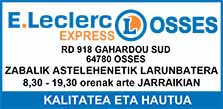It sounds wonderful and magical – even the original roots of the Basque people are contested… some theories put them in Basqueland even before the Indo-Europeans. For a culture as young as post-colonial South Africa this seems like a depth and richness of history that we have not yet reached.
Probably Kurlansky writes with some bias, even if he tries to be absolutely objective, because from his tone it seems that he admires the Basques, even their quarrelsome , ethnocentric nature. Even so, Basqueland (and on reflection, Catalonia) have moved way up my ever expanding list of “places to visit asap”. Since food features very heavily in how I experience other countries & cultures, Kurlansky’s recipe inserts and their context in history left my mouth watering and with more than a little curiosity – baby eels or fish cooked in only oil, garlic and peppers… Oh my gosh… and the creamy gateau de basco. What on earth could go wrong?
Of course, the people are what make them Basque – their language, their expression of their culture and what makes them feel distinctly Basque; these are things touched on in a Basque History, because I am sure that this is how the author experienced their culture and their identity. However, no amount of writing or reading about this can be a suitable substitute for the original! It is in talking to people and spending time in their space that you would get to know their reality and maybe also a little bit of what shaped these people and their identity. This reminds me of an acquaintance who went to Basqueland and asked someone to “please say something in Euskera”, to which he got the angry reply “I’m not a monkey, repeating little phrases to tourists!” So… there’s a way to go about it and a way not to. :)
As to the language, as Kurlansky writes, it seems like Euskera is one of the vital parts of Basque identity (as Afrikaans is to descendants of Dutch colonists in contemporary SA – I just mention this again because this is my frame of reference). It seems completely out of context in the sea of romance languages (Spanish and French), but it continues to flourish through education, cultural socialization and literary production. Kurlansky writes that they even require their leaders and elected officials to be fluent in Euskera.
In conclusion, this book was engaging, interesting and so well researched, from the mysterious roots of the Basque people, through the age of the Visigoths, the Vikings and the Roman Empire. In terms of modern history, their fight against and suffering under Francisco Franco is also examined in detail. It is a failure of my historical and geographical education that I always thought Guernica is a city in Spain… Another world has opened up to me and I intend to explore it!



 Enviar a un amigo
Enviar a un amigo Añadir comentario
Añadir comentario








